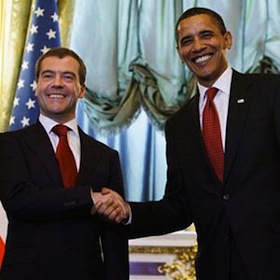Short Term Steps Towards Deep Reductions
July 8, 2011
Featured Image
Today's top nuclear policy stories, with excerpts in bullet form.
Stories we're following today: Friday, July 8, 2011.
Getting STARTed: Short-Term Steps to Advance the Long-Term Goal of Deep Nuclear Reductions - James Acton in Carnegie Policy Outlook [link]
- Realistically, another arms reduction treaty is likely to be out of reach for the Obama administration, even if it wins a second term.
- Fortunately, there is much that it could do in the remainder of its first term—unilaterally, bilaterally, and multilaterally—to lay the groundwork for another treaty while reducing nuclear risks.
- ... by putting constructive proposals on the table, the United States stands to gain.
As Pakistan Expands Nuke Arsenal, U.S. Fears Grow - Mike Shuster in NPR [link]
- Recently it has become clear that Pakistan's leaders want a larger arsenal, says George Perkovich, a nuclear weapons expert at the Carnegie Endowment for International Peace. "When you talk to Pakistani military leaders, they're not shy about it," he says. "It's not a secret."
- Current and past satellite images show [plutonium-producing] reactors in various stages of construction, says David Albright, director of the Institute for Science and International Security. "It's a dramatic scale-up of their ability to make plutonium for nuclear weapons," he says.
- The security of Pakistan's nuclear weapons has caused plenty of anxiety in the United States … [but] for years, Pakistan has been fearful that in a crisis, the U.S. might try to seize its nuclear bombs.
- A growing nuclear infrastructure, an expanding weapons stockpile and ever more dangerous domestic attacks are a lethal combination, Albright says.
For the Love of Money - Simon Henderson in Foreign Policy [link]
- Pakistan and North Korea have been involved for decades in a secretive trade: The Pakistani military acquired missiles from North Korea, and Pyongyang, as part of the deal, gained access to Pakistan's uranium enrichment centrifuges.
- Abdul Qadeer Khan, the founder of Pakistan's nuclear weapons program, provided me with a letter written in 1998 by a high-ranking North Korean official, which laid out payments of cash and jewelry intended for two Pakistani generals in exchange for nuclear know-how.
- But the larger issue of why North Korea has been so enthusiastic about acquiring, and subsequently exporting, nuclear technology remains unanswered. What motivated North Korea to reportedly build a plutonium-producing nuclear reactor for Syria … ? Why has Pyongyang sold missiles to Iran and may be helping the Islamic Republic with its nuclear program … ?
- It is simple: cash.
Russia to Allocate $730B for Armaments by 2010 - Global Security Newswire [link]
- Russia plans to acquire eight ballistic-missile submarines as part of a $730 billion armaments upgrade plan extending through 2020.
- "The Russian defense industry, which is also downgraded, and its capabilities are much smaller than in Soviet times, responded to more funding by just raising prices. They are producing the same several fighters or missiles, but for a much bigger price," [said defense expert Pavel Felgenhauer].
Former Top Diplomat Says U.K. Might be Able To Cut Trident Sub - Lee Michael Katz in Global Security Newswire [link]
- The United Kingdom might be able to cut one of its four submarines armed with nuclear-tipped Trident ballistic missiles, according to the nation's former top diplomat [ex-Foreign Secretary Margaret Beckett].
- The debate centers around "whether continuous at-sea deterrence is any longer a stance that you need to maintain, or whether you can take a less immediate approach," Beckett noted in an interview.
- Beckett also argued that the roughly 200 U.S. tactical nuclear weapons that analysts believe remain in the European theater are a relic of the Cold War face-off between the United States and Russia.



